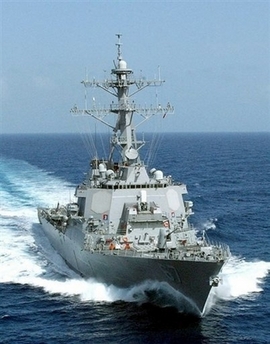 CAIRO (AFP)–U.S. Secretary of State Condoleezza Rice defended the deployment of a U.S. warship off the coast of Lebanon, saying it was designed to show Washington’s readiness to defend its allies’ interests."As to the American military presence, the U.S. exercise a military presence in the region and it has for a very long time," Rice told reporters in Cairo at a news conference with her Egyptian counterpart Ahmed Abul Gheit. "It is simply to make very clear that the U.S. is capable and willing of defending its interests and the interests of its allies. That is really all that is happening there," she said.
CAIRO (AFP)–U.S. Secretary of State Condoleezza Rice defended the deployment of a U.S. warship off the coast of Lebanon, saying it was designed to show Washington’s readiness to defend its allies’ interests."As to the American military presence, the U.S. exercise a military presence in the region and it has for a very long time," Rice told reporters in Cairo at a news conference with her Egyptian counterpart Ahmed Abul Gheit. "It is simply to make very clear that the U.S. is capable and willing of defending its interests and the interests of its allies. That is really all that is happening there," she said.
Rice was responding to a question on the deployment of the guided-missile destroyer USS Cole to waters off Lebanon, amid concern over regional stability and Lebanon’s protracted political crisis. She said the United States defended the right of the Lebanese to elect their own president. "They have lived too long under the shadow of foreign intimidation and foreign presence," she said. Lebanon has been without a president since last November.
The MP majority accuses Syria of blocking efforts to elect a new president in Lebanon. The opposition last week slammed the presence of USS Cole as military interference, while the government said it didn’t ask for the warship to be sent.
While the US State Department says the Cole and other warships are being sent to the eastern Mediterranean to support regional stability amid Lebanon’s political crisis
"It has done Hizbullah a huge favor," says Amal Saad-Ghorayeb of the Carnegie Endowment’s Middle East Center in Beirut. "It’s a sign of political bankruptcy on the part of the US. They have failed to achieve anything in Lebanon; all they have left is military muscle-flexing." Analysts here are divided over whether the USS Cole’s presence is intended as warning for Hizbullah or Syria. But it has reminded Lebanese of the last time the US sought to intervene militarily in Lebanon, an involvement that had disastrous consequences.
"These sort of gestures do not work around here," says Timur Goksel, a university lecturer in Beirut and former United Nations official in Lebanon. "Last time they shelled the Druze mountains. What are they going to shell this time? Dahiyeh?" he added, referring to the Hizbullah stronghold in Beirut.
Pentagon officials have said that the USS Cole, which is accompanied by two refueling ships, could soon be joined by some of the six-ship Nassau strike group, consisting of troop carriers, three more guided missile destroyers, and a submarine. Military analysts say it will be the largest American naval presence in the eastern Mediterranean in many years. The ships will not sail into Lebanese territorial waters, which extend 12 miles from the coastline.
"It’s the start of a new campaign to change Syrian behavior" says Sateh Noureddine, a columnist with Lebanon’s As Safir newspaper. "It’s just the first signal from Washington that the Bush administration is fed up with Syrian behavior in Lebanon, Iraq, and the region. I think the Syrian regime will realize in the near future that it cannot continue challenging the whole world."
Syria, however, shows little sign of being cowed by the warship. Walid Muallem, Syria’s foreign minister said that the arrival of the USS Cole "shows that the United States is striving to undermine all political solutions in the Lebanese crisis."
Lebanon has been without a president since November, due to a deadlock between rival political factions. The crisis has defied regional and international mediation and has fostered a deterioration in relations between Damascus and some of its Arab neighbors, particularly Saudi Arabia, a strong backer of the Lebanese government.
Last week, Saudi Arabia transferred its ambassador in Damascus to Qatar and urged its citizens to leave Lebanon because of the risk of violence. Saudi King Abdullah also has hinted that he will not attend the Arab League summit hosted by Damascus at the end of the month. A Saudi boycott of the annual event could encourage other Arab heads of state to stay away, embarrassing Syria and straining even further its already brittle ties with the Gulf kingdom.
Analysts view the moves by Saudi Arabia, coupled with US warships off Lebanon, as part of a coordinated campaign by Washington and Riyadh to squeeze Syria. But many also see these developments as further undermining the confidence in national stability among Lebanese, many of whom say their fate rests in the outcome of a regional power fight.
"Doesn’t anybody think about this poor country?" asks Mr. Goksel, criticizing Saudi departures and the USS Cole deployment. "They are punishing Lebanese, scaring them, and panicking them."



